Mr. Vampire (1985)
Directed by: Ricky Lau
Written by: Cheuk-Hon Szeto, Ricky Lau
Starring: Ching-Ying Lam, Moon Lee, Ricky Hu, Siu-Ho Chin
AKA GEUNG SEE SIN SANG
HONG KONG
ON BLU-RAY: 20th June, from EUREKA ENTERTAINMENT
RUNNING TIME: 96 mins
REVIEWED BY: Dr Lenera
Master Kau, a Taoist priest and expert in the supernatural, is asked by wealthy businessman, Yam, to remove Yam’s deceased father from his grave and rebury him, with the hopes that doing so will bring more prosperity to the Yam family. However, the body has not decomposed, so Kau has it moved to his house for further study, but Kau’s none-to-competent students, Man-choi and Chau-sang, accidentally ensure that the vampire comes to life and kills Kau’s son. Kau is imprisoned by Inspector Wai, who’s infatuated with Yam’s daugher Ting-Ting. So is Man-Choi, while Chau-sang is distracted by a female ghost named Jade….
I would imagine that Fright Night and The Lost Boys are the two that tend to come to mind when one thinks of top comedy vampire movies, a subgenre which contains a hell of a lot of dreck but also a surprising amount of good stuff; vampires and vampirism can be funny, it’s a fact. I’m especially fond of a title that isn’t often mentioned these days: Love At First Bite, which to me is the only successful updating of Dracula to modern times, while the much more recent What We Do In The Shadows proves that they can still pull the comedy vampire movie off these days. Mr. Vampire might not be one that is usually immediately thought of, but I have to say that, having just watched it again, this totally bonkers but absolutely infectious melding of slapstick, comedy-of-errors, martial arts, and Chinese superstition takes the crown. And it’s also one of the films that any fan of Hong Kong cinema ought to show to newcomers, to explain to them why, once upon a time, before CGI had reared its not always ugly but increasingly irritating head, there was a time when Hong Kong was making the most exciting commercial cinema in the world, when names like Jackie Chan and John Woo were at the very peak of their powers, when you would often come away totally exhausted but also exhilarated by the outrageously inventive, unpredictable and thrilling 90 minutes that you’d just watched – and want to tell everybody else about it.
The idea originated with producer Sammo Hung who was inspired by stories he’d heard from his mother as a child, plus ‘Strange Stories from a Chinese Studio’ by Qing Dynasty writer Pu Songling. Wong Ching wrote the story and the first script draft, which was then rewritten by Barry Wong and Sze-to Cheuk-hon with Hung and Eric Tsang also making contributions. The writing ended up taking a whole year, something highly unusual for a Hong Kong movie. It was shot, typically, in Taiwan and Hong Kong where the body exhumation scene was filmed on a hugely familiar city hill location where many movie martial arts fights have taken place. During filming in the extremely hot summer months, Yuen Wah suffered as he was not allowed to remove the plastic from his face, being unable to move, talk or eat properly. He barely got any sleep because the putting on and removal of his makeup took two to three hours every day. Near the end of shooting, the cast and crew came under pressure to work faster, as the movie screening was around the corner, while Hui kept having to ask for more finance. The film was expected to lose money, but it became a huge hit, and led started a craze for Hong Hong vampire movies including four sequels, with no less than eight being made at one point. Golden Harvest attempted to make an English-language version of Mr. Vampire under the title Demon Hunters, with Yuen Wah taking over Ching-ying’s role as well as Michelle Phillps from The Mamas and the Papas. However, after three weeks of shooting, Golden Harvest pulled the plug, chiefly because Wah had difficulty with speaking English.
Mr. Vampire melding of its elements is perfectly set out in the opening sequence; basically if you don’t like what you see, there’s not much point continuing, though I think you probably will like what you see. A man enters a morgue with a candle-filled altar and welcomes his “uncles, brothers and sisters” before pulling back a curtain to reveal a row of vampires, all dressed the same in traditional garb and all with parchments on their faces to keep them inactive, though they still seem to sway a bit. He then sticks some candles on the end of a coffin, but the candles fly off and, when he twice opens the coffin, a skull bites him and an arm grabs him; it’s both mildly scary and funny at the same time. When going back to check the “numbers of the vampires”, he’s surprised from behind by the one who was in the coffin, and seems in danger – until the vampire’s teeth fall out and it’s just a prank. However, the other vampires are now alive, hopping towards him, and the hopping is curiously creepy at first even if it probably sounds like it wouldn’t be. However, Kau and another expert in these matters arrive on the scene to defeat the creatures with martial arts skill and putting a finger on their forehead, whereupon they flee. Dr. Who failed to address the idea that the Daleks can’t go up stairs for ages, but Mr. Vampire is brave enough to have one of its hopping menaces have trouble going up steps almost immediately, even showing him being helped by one of our human characters. This doesn’t stop vampires in later scenes from being appropriately menacing when they’re required to be, or us from feeling anxious that our heroes and heroine will survive. This film sometimes takes real chances, chances that could have backfired, but which just tend to add to the incredibly high fun factor.
After this, the accent is even more on humour for a while, with the horror and action side having to wait, but it doesn’t matter, because it’s mostly genuinely funny. Hong Kong humour doesn’t always travel well for outside audiences [I still struggle through those Lucky Stars films despite their terrific action], but Mr. Vampire‘s humour is generally universal and kids may laugh even more than adults. Most of us would at least smile when Kau and Man-choi go to tea with Yam and Ting-Ting, order coffee [which they’ve never had before] instead and think that the milk provided is also coffee and intended to be drank separately from the black coffee, eventually putting milk and sugar on tarts – though the scene does suggest that a theme of old vs. new will be prevalent throughout the film but instead never appears again. And most of us will at least chuckle when Chau-sang, left to manage the shop his aunt runs for a bit, is told that a prostitute is coming into the shop and mistakes the respectable Ting-Ting for her. It’s Man-choi who falls for Ting-Ting, cue for a little bit of the usual leering which some modern viewers may find uncomfortable, though it leads to a truly hilarious scene where Man-Choi magically causes her other admirer Inspector Wai to truly embarrass himself. The focus of the story’s romantic angle though is on Chau-sang and his female ghost friend Jade. She first appears in a really atmospheric and beautifully photographed moment, being carried on a rickshaw in slow motion amid lots of fog while children sing a song on the soundtrack, but when she leaps onto the back of Chau-sang’s bicycle he doesn’t notice and she falls off and bangs her head on a branch. But we don’t mind that even serious, moody bits like this end with a laugh, so well by now are we into the film’s mindset. Gradually worked into the main narrative, this subplot, where poor Chau-sang finds himself in danger from “sexual exhaustion”, is a precursor to A Chinese Ghost Story and its many imitations – god how influential was this movie?
Of course the vampire element is gradually brought back more and more, with possession, murder, kung fu [which Moon Lee, playing Ting-Ting, sadly doesn’t get involved in], and lots of fascinating new lore for us to get our heads around which would have kept Hammer films going for another decade of neck-biting movies [and check out the makeup on some of the vampires, it’s surprisingly similar to the look of the ones in the Hammer/Shaw Brothers collaboration The Legend Of The 7 Golden Vampires]. Webs of string strengthened with chicken blood is supposed to keep the undead trapped in their coffins. The thing they seem to fear most, and can heal those on the road to becoming vampires, is glutinous [sticky] rice, but be careful you don’t get another kind of rice. These vampires are blind [usually] and the best way to protect yourself is to hold your breath, something that leads to some genuinely tense moments. Rubbing your eyes with a certain plant leaf can make you see the hideous true appearance of ghosts. It doesn’t really matter very much that makeup and effects look as cheap as they come and are rarely dwelt on, because we’re having so much fun here, though I wouldn’t be adverse to a big budget remake. Likewise some of the sets, though Peter Ngor is clearly photographing some blue-heavy nighttime scenes with as much skill as he can manage and trying hard to make the production look more expensive, and I did like the details in Ting-Ting’s room which show how Westernised she is. Plot-wise the thing is surprisingly cohesive despite the feeling of randomness that’s often about, though it does seem to suddenly end as if they’d ran out of money to have a proper wrap-up. But then many Golden Harvest films did the same thing; send the audience out of the cinema on a high.
The majority of the performing is very broad, especially from Ricky Hui, a popular comedian of the time whose antics here occasionally have the potential to exhaust, but by the time he – for some reason – acts all effeminate while under the influence of vampirism, it might also seem perfectly normal in this film to some. Billy Lau as Inspector Wai also does his very best to chew the scenery, though he’s still menacing in scenes which show a nasty side to the character. Lam Ching-ying is undoubtedly the strong, mostly sober centre to all the madness, but even he gets involved in some goofiness, such as when he keeps getting his head stuck between some prison cell bars, and the first thing that frees him is somebody else pulling down their trousers, though he performs even these scenes with restraint compared to others. Surprisingly the music score, mostly by Anders Nelsson, is very restrained too, holding back on the expected comical tunes and not even really trying to pump up the action scenes. The film has enough energy without it. It had been a very long time indeed since I’d last seen Mr. Vampire, but I had a total ball with it from beginning to end, and it might very be one of the best films with which to introduce newcomers to the wonderful world of Hong Kong cinema; I feel that many younger teenagers [the ’15’ rating seems a little strong seeing what can get into a ’12’ these days] would even love it.
Rating: 









Mr. Vampire comes to Blu-ray from Eureka Entertainment in a superb transfer, though this is of course par for the course these days; no more do we seem to get those odd yellowy transfers. Colours are vibrant, skin tones look accurate, there’s no black crush but the right amount of grain, and – well – you can sometimes see the wires now, though this could not be avoided with High Definition.
Eureka have typically opted not to port over the special features from the Hong Kong Legends DVD with which Bey Logan is involved, these here being a commentary and a featurette about Lam Ching-Ying. But three interviews remain, and Frank Djeng , who’s currently working on a Bruceploitation documentary which I will have to see, provides another of his calm but informative and observant audio commentaries. He tells us that many of the authentic-seeming rituals and devices were just made up [the idea of holding your breath came from a game of hide and seek played during production], that these 1910 folk speak modern slang which was understandably very funny for Chinese audiences but something less easily picked up on by others [I did, but then I’ve been watching these films for decades], and that a set used in Fist Of Fury is being used – I should have noticed the latter, seeing how often I’ve watched that movie. During the second half Djeng sometimes runs out of things to say, though it’s nice hearing his experiences of going to see Hong Kong films in Chinatown where people would often come in at any time and not even know or care what film they were seeing. Overall a good track with not too much time spent on biographies.
Chin Siu-Hou enthusiastically gives a pretty lengthy [42 mins] interview, going into a lot of detail about his experiences on the production, including being asked to repeat a stunt [they only let him do the ones which he was totally confident about] five times despite it injuring one of his feet and then having his first take be the one that was used, and how jokes improvised during takes were often used. He also discusses vampire movies, supersition, and being typecast. I initially thought that the Moon Lee interview was the one also included on the Zu: Warriors Of The Magic Mountain, and it does cover a bit of the same ground, with Lee again describing her Chinese dancing, but she also delves into her memories of Mr Vampire. We hear how Lam Ching-Yin just sat there thinking while everyone else goofed around, how stinking dead chickens made shooting some scenes unpleasant, and that she actually only fooled people into thinking that was a good martial artist. She sure fooled me in films like Angels. And director Ricky Hui talks a little about the production, including the cutting of much of Yuen Wah’s footage, shifts that lasted twelve hours, and how one character was originally meant to die. Together we learn a great deal about the film, with surprisingly little repetition.
Mr. Vampire is probably even more insanely fun than Zu: Warriors Of The Magic Mountain. One of the essential Hong Kong movies in a very fine disc. Highly Recommended.
SPECIAL FEATURES
*Limited Edition O-CARD with new artwork by Darren Wheeling [2000 units]
*Limited edition collector’s booklet featuring new writing on the film [2000 units]
*1080p presentation from a brand new 2K restoration
*Original Cantonese audio (original mono presentation)
English dub track produced for the film’s original European home video release
*English dub track produced for the film’s original American home video release
*Newly translated English subtitles
*Brand new and exclusive feature length audio commentary by Asian film expert Frank Djeng (NY Asian Film Festival)
*Archival interview with Chin Siu-Hou [40 mins]
*Archival interview with Moon Lee [15 mins]
*Archival interview with Ricky Lau [12 mins]
*Alternate end credits
*Original Hong Kong Trailer

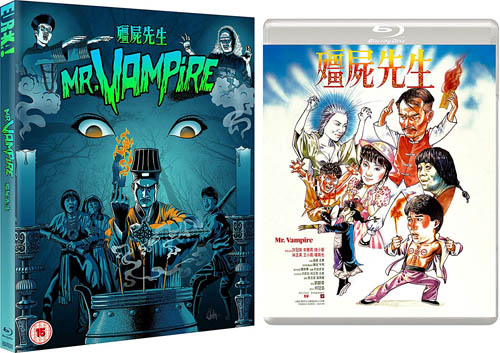
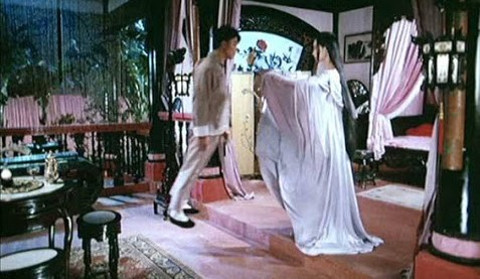
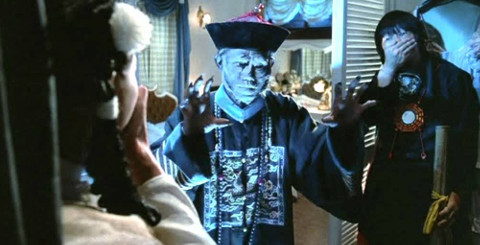

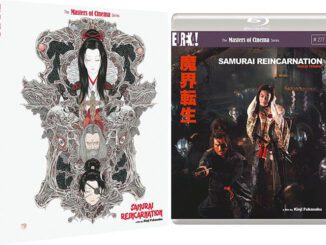
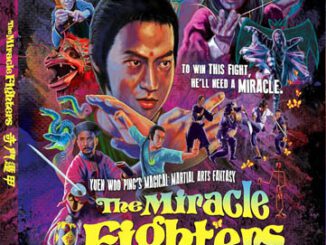
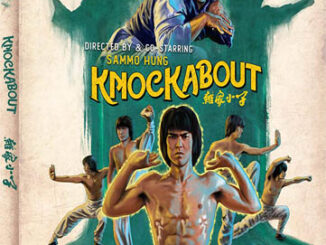
Be the first to comment